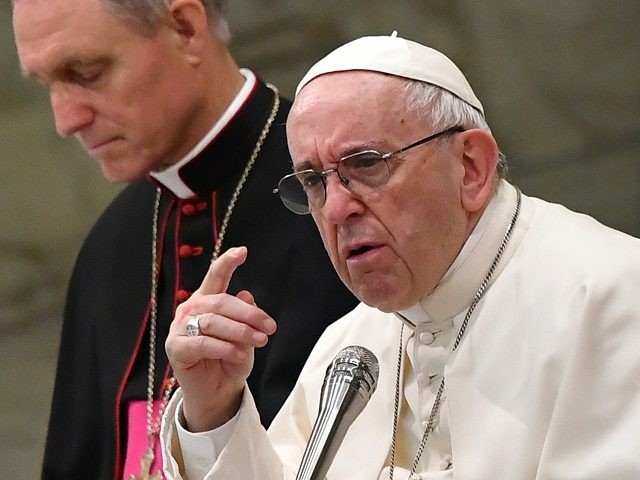Pope Francis adopted his toughest stance ever against populism Tuesday, comparing populists to Adolf Hitler and suggesting that populism caused the Second World War.
“It is important for young people to know how populism is born,” the pope said Tuesday at a book launch in Rome. “I think of Hitler in the last century, who had promised development for Germany. They should know how populisms begin: by sowing hate. You can’t live sowing hate.”
The pontiff’s words struck hard in a country living under its first elected populist government in decades, formed by a coalition between the progressive, Eurosceptic 5-Star Movement and the pro-sovereignty Lega party.
“Study your history, this is the way the Führer started, with racial purity,” he said. We are now in full World War III fought piecemeal and even religion is deformed to be able to hate better.”
“Making hatred grow, creating violence and division represents a path to destruction and suicide,” the 81-year-old pontiff added.
Increased efforts are needed to teach the young about the history of the First and Second World Wars “so they do not fall into the same error and so they know how populism spreads,” he said.
The Pope’s comments came in response to 83-year-old Fiorella Bacherini, an Italian teacher who works with immigrants, who told him that she was concerned about a rise in anti-immigrant sentiment.
Migrants, the pope said, “must be welcomed with an open heart and open doors. Closure is the path to suicide. It is true that migrants must be welcomed, but they must also be accompanied and above all they must be integrated.”
“A government must have an open heart to receive and good structures to assist integration, and also the prudence to say: I can do it up to this point, but no further,” he said.
Accepting migrants, Francis added, “is a biblical mandate. We think of Europe that has been made by migrants, by cultures mixing together.”
Tuesday’s comments represent the pope’s strongest condemnation of populism to date, although his anti-populist message had already been growing more radical.
In January 2017, Francis gave a lengthy interview to the Spanish daily El País in which he was asked whether he was worried about the spread of a populism that capitalizes on “people’s fears,” preaching “a message of hate.”
In his reply, Francis distinguished between a grassroots populism, where it is the people who are “the protagonists,” and a cult of personality where a charismatic figure like Hitler rises to power and is welcomed as a savior figure.
“For me the most typical example of populism in the European sense is the Germany of 1933,” Francis said. After Hindenburg, “Germany tries to get back up, searches for its identity, looks for a leader, someone to give it back its identity and a youngster named Adolf Hitler says, ‘I can do it; I can do it.’”
Whereas the first sort of populism is a good thing, the latter can be very dangerous, he said.
The risk, Francis said at the time, is that in times of crisis we lack judgment and people can begin to think, “Let’s look for a savior who gives us back our identity and let’s defend ourselves with walls, barbed-wire, whatever, from other people that may rob us of our identity.”
The following month, Francis urged Christians to change their attitude regarding immigration, claiming that a failure to welcome migrants is rooted in selfishness and fueled by “populist rhetoric.”
This past summer, following the election of Italy’s populist government, the pope asserted that populism is definitely not the solution to Europe’s immigration crisis.
Asked what he thought the solution was to the immigration crisis that seems to be causing Europe to crumble, the pope answered emphatically.
“Populism is not the solution,” he said, adding that Europe would disappear without migrants because no one is having children.
Follow Thomas D. Williams on Twitter Follow @tdwilliamsrome.

COMMENTS
Please let us know if you're having issues with commenting.